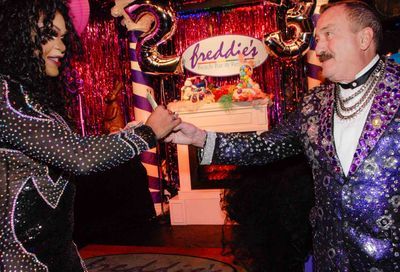DADT Drama in Trial
Margaret Witt asked for a trial to contest her discharge; now the government is ready to put her relationships under the microscope
The story of Air Force Reserve Major Margaret Witt has some drama to it and that drama may well be trotted out this week as a U.S. District Court judge hears the lawsuit challenging her discharge under ”Don’t Ask, Don’t Tell.”
Judge Ronald Leighton, a George W. Bush appointee, has rejected a request by Witt’s attorneys to exclude from evidence any testimony or documents pertaining to the details of her early relationship with her partner of six years, Laurie McChesney. They say it is irrelevant to the reason why she was discharged from the military — for being gay.
But attorneys from the U.S. Department of Justice claim the evidence regarding Witt’s ”admitted commission of adulterous acts” is ”the very conduct that triggered her discharge.”
What’s going on here? It is well known that Witt, 46, was discharged in 2006 for having acknowledged she had a relationship with a woman. Her case has received widespread attention. There was considerable discussion of it on the U.S. Senate floor this year by Republicans angry that U.S. Solicitor General Elena Kagan — now U.S. Supreme Court Justice Kagan — had not fought Witt’s lawsuit all the way to the Supreme Court.
And what do ”adulterous acts” have to do with it?
Hardball. Witt won the right to a trial on the merits of the military’s application of the ”Don’t Ask, Don’t Tell” (DADT) law against her. Now, she’s getting that trial, and the DOJ says there’s a price to pay.
”Having insisted at every turn that she is entitled to an as-applied analysis of the application of [DADT] to her specific circumstances,” said Assistant Attorney General Tony West in a brief opposing Witt attorneys’ request to exclude evidence regarding Witt’s early relationship with McChesney, ”plaintiff cannot now plausibly argue that the Court should ignore evidence of the very conduct that triggered her discharge. Evidence of plaintiff’s conduct is directly relevant to what the [9th Circuit U.S.] Court of Appeals identified as the material questions at issue in this matter: ‘whether the application of [DADT] specifically to Major Witt significantly furthers the government’s interest and whether less intrusive means would achieve substantially the government’ s interest.”’
In other words, if Witt has won, for herself and others in the 9th Circuit, the right to a trial in federal court when the military seeks to discharge them for being gay, then gay servicemembers need to be prepared for whatever the government can put forward to justify that discharge.
Witt has, in years past, told the press she believed she was discharged after an ex-lover told military officials about their past relationship. Witt acknowledged that she never really knew that to be the case, but the 9th Circuit –in its preliminary ruling on Witt’s right to a trial– relied on this account in making its determination.
In court documents and depositions leading up the this week’s trial, the Department of Justice has revealed that the person who alerted military officials to Witt’s being gay was not the ex-lover but rather the ex-husband of her current lover, Laurie McChesney. And DOJ contends Witt became sexually involved with McChesney while McChesney was still married to her husband.
According to West’s brief, Witt’s unit commander recommended Witt be separated from the service: ”Among the reasons for this recommendation: plaintiff ‘engaged in homosexual acts with . . . a married woman, on diverse occasions from on or about November 2003 to on or about January 2004….”
Because Judge Leighton has rejected Witt’s attorneys’ request to exclude the information that Witt’s relationship with Laurie McChesney was, for a time, taking place while McChesney was still married to her husband, the DOJ will apparently attempt to justify Witt’s discharge based on other conduct, in addition to her being gay.
”[A]n officer who engages in adultery risks compromising her stature as an officer,” wrote West in his August 23 brief. ”The risks of such behavior were enunciated long ago by Congress in Articles 133 and 134 of the Uniform Code of Military Justice, which subjects officers regardless of sexual orientation to punishment for adultery in certain circumstances. By reducing those risks, plaintiff’s discharge furthers unit cohesion, morale, and good order and discipline.”
”It will be tough on Major Witt because of the intrusive nature of the discussion,” said former Army Colonel Grethe Cammermeyer, who was in the U.S. District Court for Western Washington on Monday for the first day of the seven-day trial. Cammermeyer was discharged from her position as Chief Nurse of the Washington State National Guard in 1989, for simply stating, ”I am a lesbian.”
Also in the court, said Cammermeyer, was Air Force Lt. Colonel Victor Fehrenbach, a highly decorated combat pilot who had a DADT investigation initiated against him based on information provided to the military by a civilian. His lawsuit fighting discharge is currently pending in the U.S. District Court for Idaho.
The beginning of Witt’s trial follows by less than a week a decision from the U.S. District Court in Riverside, California, declaring DADT to be a violation of the First and Fifth Amendment rights of the federal constitution. The opinion in that case, Log Cabin Republicans v. U.S., will likely be appealed to the 9th Circuit U.S. Court of Appeals.
Support Metro Weekly’s Journalism
These are challenging times for news organizations. And yet it’s crucial we stay active and provide vital resources and information to both our local readers and the world. So won’t you please take a moment and consider supporting Metro Weekly with a membership? For as little as $5 a month, you can help ensure Metro Weekly magazine and MetroWeekly.com remain free, viable resources as we provide the best, most diverse, culturally-resonant LGBTQ coverage in both the D.C. region and around the world. Memberships come with exclusive perks and discounts, your own personal digital delivery of each week’s magazine (and an archive), access to our Member's Lounge when it launches this fall, and exclusive members-only items like Metro Weekly Membership Mugs and Tote Bags! Check out all our membership levels here and please join us today!





















